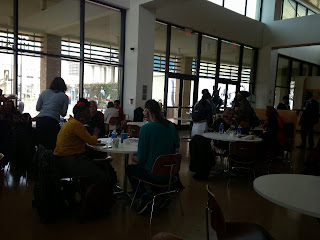Monday, February 16, 2015
How Goes Mississippi, So Goes the Nation...
As I sit and wait for my very delayed flight in the Medgar Wiley Evers International Airport, I have time to reflect on the previous day’s activities here in Jackson, Mississippi.
The fact that I was invited to go to Jackson on the exact week South Dallas Cultural Center opens Jonathan Norton’s “Mississippi Goddamn”, a play that examines the complexity of Black life in Jackson during the height of the civil rights battles, is not just ironic, but uncanny. It’s uncanny because the topic of the meeting I was invited to attend i.e. the challenge Southern performing artists face mounting work for the stage has everything to do with the failure of the civil rights movement to eliminate the historical impediments to cultural equity. This failure lies at the root of the challenge where artists of color are concerned.
Carlton Turner, Executive Director of Alternate Roots the host organization for this convening, eloquently laid out the history of Mississippi’s failure to thrive, citing some damning facts about the state’s national standing in areas like health care, education, economic development and arts funding. He opened our discussion by stating that if we are to see substantive change in our country, it needs to start in Mississippi because if Mississippi can come up, the whole country can.
With this as our start point, we began a day of exploration into how to make shifts in the current modus operandi where arts/cultural support is concerned. We explored it from the standpoint of how presenters see the problem, how disenfranchised artists view it and how major funders see it. We revisited the Culture Wars and their affect on the country’s commitment to support for culture & the arts. It was, however, pretty much agreed that although these attacks on the NEA were a devastating blow to the arts in this country, the reality was that most organizations of color never received substantial support from this agency. So the net effect on their bottom lines due to the reduction in NEA funding was negligible. We talked about how organizations like NPN/VAN, NALAC, and South Arts are working to reduce the inequities by developing programs that directly address these inequities. One participant who wasn’t a part of an arts organization but represented an agency involved in social justice work made a telling comment when she observed that we couldn’t expect the ruling majority to respect our culture when there is no respect for our very humanity. Of course, the current #BlackLivesMatter movement is putting a spotlight on this reality like no other since the Anti-Lynching Movement of the early 1900s.
The gathering of participants was multi-generational, multi-racial and multi-disciplinary so many viewpoints were expressed. The dialog was robust and honest and at no time did I feel like I was wasting time talking about a topic I often avoid these days because so much time is wasted talking about it but too little time spent on finding workable solutions. The Mellon Foundation and New England Foundation for the Arts were the major national funding organizations in attendance (they actually underwrote our attendance) and I was impressed with their willingness to just listen and absorb rather than dominate the dialog. I was equally impressed with the white participants doing the same thing when the participants of color told their stories. The often-stultifying habit of whites trying to explain racist practices or at least their role in eradicating it as a way of distancing themselves from the privilege they derive from the system was not in evidence at this convening.
Everyone acknowledged that a lot of work must be done before we see any real equity but at least those in the room committed to influence their own sectors to get on board with the effort to make substantive changes in how southern artists/organizations in general and southern artists/organizations of color in particular are invited to the table both regarding policy making as well as receiving grants/funding. My hat goes off to Alternate Roots, Turner World Around Productions, Mellon Foundation and New England Foundation for the Arts for making this convening happen and all the other work they are engaged in to make cultural equity a reality rather than an on-going conversation.
Subscribe to:
Post Comments (Atom)





No comments:
Post a Comment